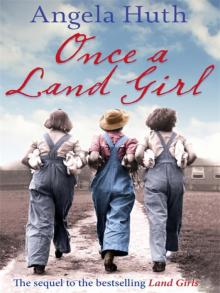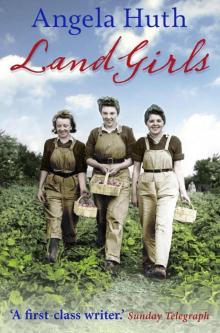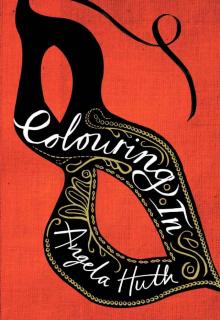- Home
- Angela Huth
Of Love and Slaughter Page 3
Of Love and Slaughter Read online
Page 3
The house was freezing. A tangible cold prowled after him, brushing against him like an animal. In the hall the grandfather clock tapped against the silence, impervious to change. Mocking, thought George, who was having difficulty in pulling off his greatcoat. Bloody clock. He had always hated it. It might have to go.
He went to the study and shut the door behind him to regain absolute silence. The fire which had warmed his father’s last few days was a pile of ash and cinders. The rug that had warmed his father’s knees was a whirlpool of cold tartan in the armchair. George picked it up, sat down and laid it over his own lap. He wept, but only for a few moments. Then his father’s voice rose from the ashes: You do as you think best, boy. George knew he was drunk, but the voice was louder than an illusion. Well, he would do as he thought best. Then, through darkness, cold, ash, silence and an emptiness that made him giddy, an idea came to him. He shut his eyes.
Three days later the new chairman of Elkin, Anderson and Pease sat in his father’s old chair behind the empty desk. Miss Hollow came in, shaggy-eyed, tight-mouthed.
‘I came in yesterday,’ she said, ‘but you weren’t here.’
‘No,’ said George. ‘I was sorting out a problem about a late delivery of feed at home. I should have rung you. I’m sorry.’
‘I didn’t like to disturb you. I thought, there being nothing important, nothing pressing, I wouldn’t phone.’
‘That was very kind. I needed a day or two.’
Their relationship, George appreciated, seemed to have taken a less hostile turn. There was something to be said for the unification of grief. But it lasted only a moment. Hollow slammed a single handwritten envelope down before him.
‘I’ve dealt with the usual stuff. Nothing important. This seems to be for you.’
The fact that a letter had arrived for George, so newly in his role as chairman, she saw as betrayal, an affront. George picked up the envelope: loopy, fountain-pen writing in black ink, postmarked Cornwall. Another letter of sympathy, he supposed.
‘Thank you, Hollow – I’m sorry, Miss Hollow.’
‘The old partners always addressed me as Hollow, but it’s up to you.’
George acknowledged this concession with a kindly smile.
‘I’ve a few things to go through, then we could have a talk about pending cases.’
‘Not many pending, Mr Elkin, as you’re no doubt aware.’
‘Please call me George. I’m a different generation
Hollow sniffed.
When she had gone, George glanced at the view of the room that his father must have studied for the past forty years. Brown wallpaper peered through chinks in the bookshelves which rose like cliff-faces of leatherbound and gold-tooled legal tomes. There were four watercolours of the local hunt by Lionel Edwards, an artist David Elkin had greatly admired and fiercely supported against critics of his mode of unfashionable, skilled draughtsmanship. He would never sell those, thought George. They would come to the farm. There was a small looking glass that held a clouded reflection of the window behind the desk and the spectral outline of the cathedral. Piled on the floor were dozens of files tied with pink tape. George tried to imagine what it must have been like for his father, who loved the open air, being cooped up in this claustrophobic room for so many years. He failed. He knew only that he was not going to do the same.
George slit the envelope and drew out a postcard, a picture of St Ives. The loopy black writing was randomly flung across the back.
George! he read. Tracked you down at last. I hope. I saw an obituary of your father and Oxford glimpses of you (so like him, Judging by the handsome photograph) came back to me. Then by chance I ran into Toby Talbot – remember him, Christ Church? – and he said he hadn’t seen you for ages but knew you’d joined the family firm and somehow knew its name. I pondered, as you can imagine, so long after Bablock Hithe, before deciding on an impertinent question – could we meet for a drink? Am in St Ives writing about the current painters, lovely job, fantastic fish, about to set off slowly through the West Country back to London and am planning a night at the Bridge Hotel on Wednesday, have to see the collection of some old woman near Exeter. My hotel can’t be far from your office, would a short meeting be in order? Is there a wife to meet? Children? I’d love to catch up with what’s been happening to you since those ginger biscuits by the river. I ran into Serena the other day, plus pushchair and twins. Give me a call if you think meeting is a good idea. I’m still Crichton.
Love, Lily.
Serena! George thought about her. Eager, friendly, good. Pretty apricot hair, shy about sex, nothing to enchant a man’s heart. He was glad she had twins. She would be a good mother. Serena was a long time ago. So was Lily, of course, and he could remember even less about her. Lily the Accoster in the Broad, Lily the emphatic one: that was it. Picnic by the river: she’d accused him of being unobservant, hadn’t she? Odd girl. Hadn’t given her a thought. Wasn’t very keen on the idea of a reunion now: bad timing, the sadness still heavy. Reunions with people you’ve shared little with in the first place are usually misguided. But it would be churlish not to respond to her signal. Later in the morning, when he had written a few thank-you letters about his father and gone through the scant business with Hollow, he would ring the Bridge Hotel. He had no idea in mind what he would suggest. He did not fancy the thought of a long lunch with Lily. A meeting, just because she happened to be in the same area, was no guarantee of reward on either side. It could be a waste of time.
Hollow returned, sullen.
‘Mrs Williams rang about her will. I made an appointment for her, two o’clock, seeing as the diary’s clear.’
‘Fine.’ So lunch with Lily would have to be short. George took in Hollow’s disgruntled face. He felt sympathy. Her world, as much as his own, had been turned upside down. ‘Hollow,’ he said, ‘surely you weren’t always the only secretary?’
‘Office manager.’
‘Office manager. Of course. Sorry. I remember my father speaking of others.’
‘There was a time when there were two under me. Jennie and Magda. We had more work than we could manage, then. When Mr Pease retired it began to tail off.’ She folded her arms, making a shelf for her undulating breasts, indeterminate beneath the sloppy red wool of her jersey. ‘You could say the firm’s been … going downhill ever since then,’ she said.
‘You could indeed.’ George sighed. Hollow stared at him, challenging. He knew she could read his mind, but now was not the time. He needed to think further about how, and when.
‘Anything I can do for you?’
George managed a smile. ‘I’d be grateful if you could organise a new telephone.’ Hollow’s face began to close. ‘I mean, it’s not that I’ve anything against this one. But it’s quite a weight.’ He lifted the receiver, attempted to untwist the gnarled brown cord with his free hand. ‘Cord always in a muddle. So slow to dial… don’t you think? We’d be better off with a … wouldn’t we?’
Hollow did not appreciate his lightness of tone.
‘Very well,’ she said, and left the room.
An hour later George, defeated for the time being, rang the Bridge Hotel. Miss Crichton was expected but had not yet arrived. He left a message. At lunchtime he left the office, telling Hollow he would be back in an hour.
‘Mr Elkin used to go to the Bridge most days for a ploughman’s,’ she said.
‘I’m off to do the same.’ It occurred to him that this might cheer her, the knowledge that the new chairman was instinctively following the ways of the old one. But her eyes did not leave the high bank of her Royal typewriter – God knows what there was to type – and she offered no word of encouragement.
He went into the hotel bar, crowded as always with murmurous locals. The ceiling was low, black-beamed. The open fire always smoked, so a scent of apple wood mixed with the smell of beer and thick country clothes rank from years of farm life. It was the kind of room in which a sense of outdoor life – the life most of its
inhabitants came from – mingled with the safe fug of indoor life, and George liked that. It was reassuring, though not by design. Several of the drinkers had been at the funeral. They nodded at George, decided no words were preferable to clumsy sentiment.
George ordered himself a pint of lager. While he waited he contemplated the massed chorus of bottles beautifully organised against the mirrored wall behind the bar, the wine glasses hanging from their stems, the least popular bottles of aperitifs and liqueurs marshalled together in the highest row. Here was a barman who knew his job, thought George. He admired those who maintained order in their work, and thought sadly of the hopeless muddle into which the firm – his firm – had descended. He tried to bring Lily’s face clearly to mind.
It came to him in fragments of reflection through the glass behind the bar. For a moment he watched its jigsaw pieces approach him, memory and reality confused. Then he turned and the unbroken face looked at him, enquiring. George remembered. She seemed ruffled as she had that day by the river: just the same.
George had always harboured a – perhaps foolish, private – thought that meetings of any kind would be eased if each party knew, without explanation, what the other one had come from. If that were the case, Lily would know at this moment that George’s less-than-welcoming expression was nothing to do with her, but because his father had recently died and the heaviness was still upon him. In return, he would know what caused her eyes to dance so merrily. Both would approach the other accordingly. But hampered by the obfuscation that impedes all human contact before the process of discovery has begun, they could only employ the simple tools of politeness, enquiry, surprise.
‘It’s you!’
‘Lily!’
‘You didn’t mind?’
‘Course I didn’t mind. What would you like to drink?’
‘Goodness. It’s been quite some time. Fizzy mineral water, please.’
‘You’ve driven up from Cornwall?’
‘I’ve driven up from Cornwall.’
‘Look: why don’t you go and grab that table by the fire. I’ll bring the drinks and something to eat. You must be hungry.’
Lily nodded and moved away. She bent her way through the crowd. Several farmers glanced at her passing. George joined her with plates of bread and tomatoes and cheese. Lily smiled. She had taken off her coat and, like Hollow, but to different effect, folded her arms under her breasts. She seemed grateful for the warmth from the fire.
There was no awkwardness at that short reunion, but nor was there the flaring of instantaneous ease that signals a harmony of souls. They exchanged news, Lily first. She had tried many things since leaving Oxford. At present she was the art critic for a quarterly magazine with a small but knowledgeable readership. This had led to her being called upon to give her expert view on a collection of nineteenth-century English watercolours – hence the journey to the West Country. She had on occasions lectured to sixth-formers studying history of art, but she felt unsettled, unstretched. Her wish now was for a regular job teaching children – ‘Still the old desire to make looking into a habit,’ she smiled. ‘But it’s hard to find a school that’s remotely interested in children studying pictures.’ George gave a much briefer account of his own life since university, not imagining it could be of any real interest to her. He ended with the death of his father.
‘I’m sorry to have barged in so soon after that,’ Lily said.
‘You haven’t barged in. It’s good to see you again.’
‘So: what now?’
‘That’s what I’m wondering.’
‘The alternatives?’
‘I either imitate my father – come into the office every day, help out a little on the farm at weekends. Try my hand at being a solicitor, make use of my training. Or I give all that up, sell the business and become a full-time farmer.’
‘Which do you want to do?’
‘I was never a natural lawyer. I only agreed, not knowing what else I wanted to do, because my father expected me to take over the firm. It’s been in the family for generations, though it’s currently on its last legs. I’m not sure there’s any point in trying to re-establish things if my heart’s not in it.’
‘Course not.’ Lily paused. ‘Have you made up your mind?’
‘I think I have.’
‘Good. That’s good. What about the farm? Thriving?’
‘Sheep, mostly. Small herd of cows. We do pretty well.’
‘And the house?’
‘It’s where I was brought up. I love it, though it’s been rather neglected since my mother died. It could do with a lick of paint. My father never noticed cold, draughts, peeling walls, that sort of thing. I was away for a few years, law school and bumming round the world a bit: when I came back I was shocked by the general decay. My father was astonished when I told him a whole side of guttering had collapsed. He was past noticing. The plan was for me to live there for a while – goodness knows how that would have worked out. Probably not too well. But he was in poor health, had been alone for too long, and I didn’t fancy a small flat in the city when I could be living on the farm. So the dutiful son moved in with the aged father, and in the event we only had a few months together.’
‘I’m sorry.’
‘I’m glad I was there. Now I’ve got to brace myself for the whole business of selling up the firm, forcing the poor old secretary, who’s been there for ever, to retire early.’ He looked at his watch. ‘Speaking of whom, I must go now or I’ll be late for our only client of the day. I’ll be chided – my father was never late.’ He paid for lunch, was anxious to be off. ‘Before you go, if you’ve a moment, come and see the farm,’ he said. ‘I’d like to know what you think.’
‘I’ll be through by five tomorrow.’ Lily’s answer was so swift that the idea of a visit might already have been lodged in her mind. ‘I’ll ring you at the office and see if it’s a good time to come when you finish work. Perhaps you could lead me there. We could drive in convoy.’
‘We could do that,’ said George. ‘Bring your boots, or I’ll have to carry you across the yard.’
‘That would be a first.’
‘For me, too.’ They smiled at each other, their parting lifted into a mutual amiability which had been hovering at lunch, but had not fully taken off. Now, through a trivial exchange which conjured in both their minds an unlikely picture, it was established. George left quickly. Had he been in less of a hurry he might have noticed the hint of firm intent in Lily’s suggestion of a visit. As it was, this did not occur to him till he was on his way home that evening. Then, in his long fight with the boiler, determined that the emptiness of the house should at least be made more bearable by a modicum of warmth, Lily Crichton faded from his mind.
The next morning George rose at six and walked up the hill behind the house. It was less cold than it had been for a week. The frost had begun to lose its grip: grass, hedges, bare trees now silently jangled with a billion quivering drops of water, each one holding a particle of sky more intense in its sparkle than the actual sky. George could not understand this trick of light but it had some effect on his spirits. A curious feeling of buoyancy began to spread upwards from his feet – he stamped each foot in turn on the earth, his earth – and he sensed the sludge of grief that had muddied his head for a week beginning to evaporate as keenly as the frost.
He looked down the valley. Long yarns of mist, as if wound from each end by invisible hands, were thinning, rising. Beneath them George could see a glint of the river where he and Prodge, and sometimes Nell, had raced small plastic boats when they were children. He could see a huddle of sheep in the corner of one of the fields, so closely jammed together that from this distance they looked like a solid wool rug. Soon it would be lambing time. George looked forward to that: he hadn’t helped with the excitement of each birth since he was a boy. This year he would be there, up all night when necessary, dealing with his sheep.
If any doubts had remained in his mind about his plan when h
e ascended the hill, they had vanished completely by the time he came down. He was further elated on finding Dusty in the kitchen frying eggs and bacon. He had not expected her. In all the flurry of the last week he had given little thought, he realised with some shame, to her future.
‘You could do with some breakfast,’ she said.
She sat beside him as he ate, just as she used to every morning when he was a boy before he left for school. For George she had made a pot of strong coffee and toast. She herself sipped dark tea. The boiler had responded to George’s urgings, so the room was warm again and a winter sun, strong through silted windows, relighted the place, igniting even further George’s spirits. He loved the solid presence of Dusty, the safety of her. Her unexpected arrival this morning (though not so unexpected if he had thought about it) confirmed the whole feeling of a casting-off into a new life.
‘This is wonderful,’ he said. ‘There’s no one like you when it comes to breakfast.’
‘I was wondering if you might be needing me, still, now things have changed? Of course I’d understand if you felt—’
‘Dusty: my apologies. I should have said something before. Of course I need you. The job’s always here. How on earth could I manage without you?’
‘I could come in every morning. Keep things in order, leave something for your supper.’
‘Perfect.’ Strange how things fall into place, even in times of sadness. ‘Can’t imagine anything better. I shall be the most spoiled man for miles.’
‘Out at work all day, a man can’t be expected to run a house.’
‘I tell you what, though, Dusty. I shan’t be out at the office any longer. I’ll be out on the farm. I’ve decided to …’
‘I thought as much,’ said Dusty. She had always had an uncanny habit of guessing his thoughts.
‘I think my father would have understood.’
‘I think he would.’

 Sun Child
Sun Child South of the Lights
South of the Lights Virginia Fly is Drowning
Virginia Fly is Drowning Of Love and Slaughter
Of Love and Slaughter Such Visitors
Such Visitors Once a Land Girl
Once a Land Girl Land Girls
Land Girls Colouring In
Colouring In Nowhere Girl
Nowhere Girl Monday Lunch in Fairyland and Other Stories
Monday Lunch in Fairyland and Other Stories Another Kind of Cinderella and Other Stories
Another Kind of Cinderella and Other Stories Invitation to the Married Life
Invitation to the Married Life Easy Silence
Easy Silence